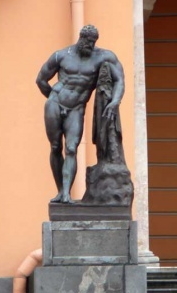Геркулес
With a bit of practice the beginning Russian student begins to recognize when a Russian word may have been borrowed from another language. For instance, кв- often corresponds to qu- in English; thus кварц means quartz. Or English th- sometimes corresponds to Russian т-; thus thesis becomes тезис. So when a student spots the word геркулес, he may recognize that г- corresponds to h- and immediately assume that it refers to Hercules, the Greek god. Imagine his shock, then, upon learning that the most common usage of the word is for oatmeal, the breakfast cereal. That's right: геркулес means limp, sticky oat flakes:
| Готовые завтраки не очень питательны. Я считаю, что каждое утро надо есть геркулес. Он уменьшает холестерин в крови и предотвращает запоры. | Pre-prepared breakfast dishes are not very nutritious. I think that one should eat oatmeal every day. It decreases cholesterol in the blood and prevents constipation. |
Геркулес was originally a Soviet brand name for oatmeal, though nowadays it is used of oatmeal generically. Why would oatmeal be connected with the image of the Greek who was famed for his strength? There is a cultural reason, actually:
| Издавна к овсу в России сложилось отношение, как к пище, дающей много силы, так как он служил основным кормом для лошадей, которые были главной тяговой силой во всех сферах. (source) | In Russia oats have long been considered to be a food that gives one a lot of strength since it was the main food of horses, which were the primary source of strength for hauling and transportation in all spheres of life. |
In the US we generally prepare oatmeal in boiling water with a bit of salt added. Once it is in the bowl in front of us, we often add a bit of milk or sugar or a handful or raisins. In Russia the oats are often boiled up in water or milk with a simply astonishing quantity of sugar mixed in. And then comes the best part... the Russians then slice off an enormous chunk of butter and drop it on top of the oatmeal. The residual heat melts the better into a glorious golden pool that stretches across the entire bowl, and every single spoonful delivers the marvelous buttery taste. You can literally feel your carotid artery clogging with every heavenly spoonful.
(BTW, the idea that butter clogs your arteries is of course a complete falsehood propagated by the CIA to rob us of the joy in our lives. All educated people know that butter lubricates the veins and arteries and makes the blood flow more smoothly...)
Finally we should mention that although you will find the Greek hero's name occasionally spelled Геркулес in Russian (from the Latin version), but you also find Геракл (from the Greek version). Since Hercules is one of the most commonly depicted Greek personages, below you will see one of the most famous Hercules statues in Russia. It is on the grounds of the Summer Palace, which was built mostly by the empresses Elizabeth the first and Catherine the second. The palace is located a short distance from St. Petersburg in a town called Pushkin, formerly Царское село. The statue is a copy of the famous Farnese Hercules. Wow. Those Russian empresses liked their men beefy. I guess Hercules must have eaten a lot of геркулес...

1 comment
You’ve missed that the same dish is called “овсянка” quite often :)
Form is loading...